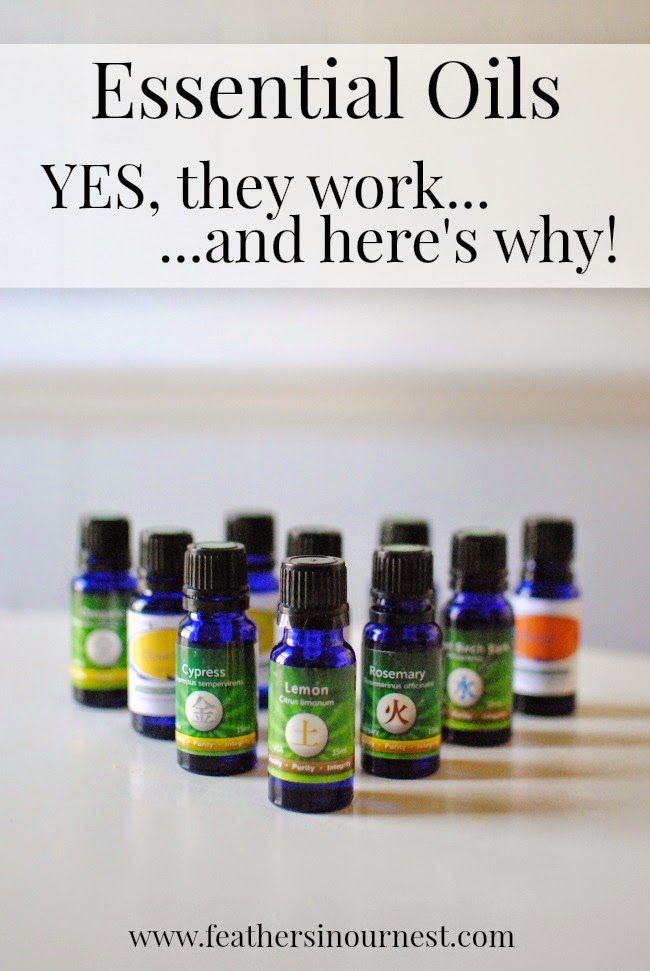
When I first become interested in using essential oils (beyond just lavender and tea tree oil), my sweet husband was a bit skeptical. He wanted me to do lots of research to make sure that essential oils really are effective!
After having done months of research, I’ve decided that you have to pick a camp:
A) Either essential oils are not in the same category as medicine, so we shouldn’t act like they treat diseases and heal maladies, OR
B) Essential oils have medicinal benefits, so we should take precautions when using them, just like we would with over-the-counter drugs!
I fall in camp B. After lots of research, I believe essential oils are effective for many different purposes, including having medicinal benefits, so we should take great care when using them so that we don’t overdose or use improperly!
Over the last few weeks, I’ve spent many hours compiling scientific studies that have been conducted using various essential oils. I hope that all of this research will help you see that essential oils ARE effective and have a variety of uses!
I’m starting out by sharing the single oils that I own personally. I’ll have to do future posts on the blends that I have, as well as other single oils! If you have any specific requests, leave them in the comments and I’ll do my best to research those oils too!
Try not to be overwhelmed by this list of 12 oils… if you’re new to essential oils, here are the three I recommend starting with. Oh, and if you haven’t read it yet, here’s a link to the post I wrote telling why I chose this particular essential oil company!
Clove Bud
This oil can be used as a topical anesthetic. It’s great for tooth pain and it is proven to be as effective an anesthetic as benzocaine (source). It smells great (just like cloves you use in cooking) and it’s helpful for relieving pain caused by sore throats as well. (To use it for this purpose, I would dilute it in fractionated coconut oil and put it in a spray bottle.) Clove is antimicrobial, antifungal, and antiviral (source) and contains natural antioxidants (source) so it’s great for treating colds, the flu, and other infectious diseases. Learn more about clove bud.
Cypress
Cypress is commonly used for treating respiratory issues. It is known to help with cramps and spasms and it tightens tissues. It has been studied to reveal high antioxidant properties (source). Cypress may be helpful in preventing diabetic or cardiovascular complications (source). Cypress helps with many different conditions and is safe to use with children (when diluted). Learn more about cypress.
Frankincense
This amazing oil is anti-inflammatory and is wonderful for supporting the immune system (source and source). Frankincense could be helpful in treating swelling of the large intestine or colon (source). It may be helpful in treating arthritis, asthma, inflammatory bowel diseases, and Crohn’s disease (source and source). Frankincense is prized for its skin care qualities. I love using it on my face every day, and I’ve seen a reduction in acne scarring since starting to use it. Frankincense has an uplifting fragrance. It can also be used to help prevent stretch marks, treat anxiety and stress, and reduce labor pains. Learn more about frankincense.
Lavender
Lavender may be one of the most versatile essential oils! It is excellent for relieving pain caused by burns or irritation caused by bites or stings. I have used it on burns and stings and it’s such a great healer. I also use it for headache relief. Lavender is effective for treating anxiety and depression (source). Several studies have revealed lavender to have sedative and mood enhancing properties (source). I love using lavender at night to help me fall asleep quickly! Lavender can reduce stress (source). Lavender can be used to treat gastrointestinal problems without disrupting the beneficial gut flora (source). Because it is antimicrobial (source), lavender is a great oil to have on hand for many different uses, including athlete’s foot, thrush, earaches, allergies, and more. It is great for use in massage, as it is very soothing to the muscles. Lavender is very safe to use with children! Learn more about lavender.
Lemon
This is an excellent antimicrobial oil (source). Lemon essential oil smells fresh and clean and it’s wonderful to use in homemade cleaners. It can be used to treat colds, infectious diseases, sore throats, and the flu. Many find that a combination of lemon, peppermint, and lavender can help alleviate the symptoms of seasonal allergies. Learn more about lemon.
Melaleuca
Melaleuca, which is very similar to tea tree oil in its chemical makeup but it is more mild, is antimicrobial, antiviral, and anti-inflammatory (source). Because of these properties, it is useful for treating respiratory issues, swollen glands, ulcers, and skin conditions (source). It is very helpful in treating acne (I personally use it any time I have a facial blemish!). The scent is very medicinal. Learn more about melaleuca.
Orange
Orange essential oil is powerfully antimicrobial and inhibits the growth of bacteria such as E. Coli (source). Orange can reduce foodborne pathogens such as Salmonella (source). Because of this, it would make a great counter-top or sink spray to help prevent the spread of illness in the kitchen. It can also significantly reduce the growth of tumors in the liver (source). Orange smells lovely and helps treat digestion, respiratory illnesses, muscle spasms, and anxiety. Learn more about orange.
Oregano
Oregano is antiviral and is useful for treating colds and coughs. In a study done on rats, researchers found that there was a significant increase in pain tolerance after oregano essential oil was administered (source). Oregano is antifungal and has been proven useful for treating ringworm (source). Oregano has antioxidant properties (source), so many use it to strengthen the immune system! Learn more about oregano.
Peppermint
As another extremely diverse oil, peppermint is anti-inflammatory, antioxidant, antispasmodic, and a natural pain killer (source). Peppermint has been proven to enhance exercise performance of athletes, including positively affecting blood pressure and respiratory rate (source). Peppermint is very helpful in treating digestive issues such as irritable bowel syndrome or recurrent abdominal pain (source). Many people find peppermint to alleviate nausea, motion sickness, and morning sickness. It is antibacterial and anti-fungal (source), and many find it helpful in treating bronchitis, sinus infections, colds, the flu, asthma, and headaches. In a study done on food, peppermint essential oil was shown to kill or reduce the presence of Salmonella and reduce the presence of Listeria in several foods. Peppermint is antimicrobial and antioxidant, and one study suggests that it could be useful in treating cancer, so more research should be done towards that possibility (source). Peppermint relieves some symptoms related to allergies (source). Learn more about peppermint.
Rosemary
This oil is antimicrobial and has been found effective against oral pathogens (source). It is helpful for treating many different kinds of infections, including staph and strep. Rosemary stimulates the hair and scalp and can prevent premature baldness (source). It is used to boost the immune system and treat colds, the flu, and respiratory ailments. Another study on rosemary found its antibacterial and anti-fungal properties to be effective against staph, E. Coli, and Candida (source). Rosemary can ease stress and help with chronic fatigue. Rosemary essential oil may prevent damage to the liver due to its free radical scavenging activity (source). Learn more about rosemary.
Sweet Birch Bark
Birch bark is anti-fungal, antibacterial, and antioxidant (source). It is NOT for internal use, and it should be kept far away from children since it smells so good! Birch Bark is anti-inflammatory and it is helpful for soothing sore muscles and joints. Learn more about sweet birch bark.
Tea Tree
Tea tree oil is antimicrobial, antiviral, and anti-inflammatory (source). As part of a mouth rinse (combined with clove EO and basil EO), it is anti-plaque, anti-gingivitis, and antimicrobial (source). Tea tree oil is anti-fungal (source), so it is helpful in treating athlete’s foot. Tea tree can be used to get rid of lice and scabies (source). Learn more about tea tree oil.
All of the research in this post was compiled by me and this post should not be lifted (stolen) or excerpted from in any way without express permission by the author. You are welcome to link directly to this post from your blog or to share it through social media (Pinterest, Facebook, etc.)! Thank you for respecting the time it took to compile this content.
Disclosure: First, I am not a doctor, so please consult your physician if you are seeking medical advice. Also, I have included affiliate links throughout this post to the essential oil company I use and love. If you choose to purchase oils through my links, it will help support this blog and my family! Thank you!










What are your reccomendations for treating MRSA? This is tough one, although I believe that the right oils for the wounds, cleaning living areas, and improving immune strength of the body can be accomplished!
Good question! Just came across this study showing several oils (grapefruit and geranium) that are effective in treating MRSA! http://www.ncbi.nlm.nih.gov/m/pubmed/15555788/
Just a note, it is grapefruit seed extract in this study, not grapefruit essential oil. You can find it in most healthfood stores.
Thanks for the clarification!
do you know of any oils that might help TMJ? My jaw has been inflamed and tight for 6 months.
Kristi, you may want to try a massage blend of (diluted) lavender (for relaxing the muscles), frankincense (to reduce the inflammation), and peppermint (for pain relief).
Do you know of a blend that will help with the autoimmune disease iga nephropathy?
I’m sorry I don’t know of anything specific for that. But I would start by using oils to boost immunity, such as Immune Support from RMO, frankincense, oregano, or rosemary.
were the research studies you speak of here carried out by third party researchers? And what makes you choose this companies EO’s vs the many others that are out there? Do the research studies encourage ingesting the oils? A trusted naturalist I know feels that they can be dangerous if ingested. Many of them are highly concentrated and can cau Seymour body to detox to quickly. One study showed a woman went into kidney failure because ingesting the oils detoxified her to quickly. Do your u know any more about this. I’m just leery when everyone is jumping on a band wagon all t the same time. It’s just makes me wonder. Doctors are not giving specific instructions on the oils, and there conflicting stories on how much, where to, and weather or not ingesting is safe
Crystal, here is a post I wrote detailing why I chose this EO company: http://www.feathersinournest.com/2014/10/researching-essential-oils.html. I am not one to recommend ingesting EOs (for the reasons you mentioned and others). I prefer inhalation and diluted topical application. The studies I cited in this post did not encourage ingesting the oils.
I love my oils. I am a fairly new user and read about using oils to prevent getting sick. I read that pirates used lavender oil before they raided bodies killed by the plague to prevent contracting it. Also, that the French people who worked in the lavender fields and soap and perfume factories were the only ones who did not get the plague due to working with the oils. I rub lavender oil on the bottoms of my feet every night before bed and although I ALWAYS get a cold or the flu right after the holidays. This year, I am feeling great even though my family and coworkers have all come down sick.
That is fantastic! (For you, not for them! Time to start sharing your oils…haha!)
Do you have a recommendation for my 12 year old son with ADHD? Thank you!
I’ve heard good things about vetiver and bergamot!
I’m wNting to place a pretty large order of eo’s from nan. Im curious how often they send out discount codes and if I should hold out for one or just make my purchase. I’m sure I’ll place my order and the next day get a discount code! But I do want the oils soooooooon!
I don’t know of any current discount codes, so I’d just go ahead and order!
I appreciate your research; I agree with treating them like medicine – there is a lot of faulty info circulating.
I have a question: Which Melaleuca are you referring to in your list? There are 4 – M. alternifolia – aka Tea Tree oil, M. cajeput – aka Cajeput, M. ericifolia – aka Rosalina, and M. Quinquenervia – aka Niaouli.
Thanks